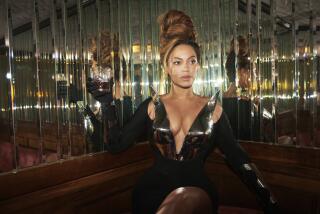Geek, Chic Clash
For about a year now, Microsoft has been trying to turn itself into a media company--with limited success.
Now, apropos of April Fools’ Day, comes a memo to employees from recently hired Michael Goff, former editor of New York-based Out magazine, that seeks to address the underlying structural barriers to the hoped-for transformation.
“After six months of study I have determined--through a ton of research and collaboration--that one of the key elements missing in the Microsoft culture is some sense of the hype, buzz, style and attitude that are so key to success in the media and entertainment industries,” Goff wrote.
“If we want to play with the big boys in L.A. and N.Y., we have to dress like the big boys in L.A. and N.Y.--even if we are girls.”
When he was hired as editorial director of Microsoft’s Interactive Service Media division, Goff was encouraged to “search out his inner geek.” But he also was tasked with extending the software empire’s reach into the world that he used to inhabit.
So although most of his fashion tips are not strictly serious (Wear more black. No Teva sandals after Labor Day. College T-shirts are not chic. Polar fleece will be worn only under other items of clothing. Wear sunglasses--preferably black--inside.), Goff says he is also trying to make a more serious point about the gap between media and computer culture.
“When you’re making software, it works or it doesn’t work,” Goff said in a phone interview from his Redmond, Wash., office, where he is wearing black jeans from Banana Republic. “It’s an on-off switch. In media, you want to create an emotional relationship with the audience so they’ll come back.”
To build up the relationship end of things, Goff has been importing editors from magazines such as Vogue and Esquire to Redmond. Hollywood media types, suitcases full of black clothing in tow, have also been heading north, drawn by the prospect of a limitless new industry.
Still, says Goff, on both sides “there’s definitely a lack of understanding, a sense of ‘how do you do what you do and why do you do it so differently from what we do?’ ”
“You’ve got this geek culture here. They refer to it as such and are proud of it. We are adults, and we go into a cafeteria and we eat pizza. For all these people who are used to doing lunch, it’s a very different deal. At some point every one who moves here looks around and says, ‘Oh, my God, what am I doing here? This is not my life.’ ”
On the other hand, Dockers-wearing, Frisbee-throwing Microsoft employees may look at the Prada-clad, sparkling-water-drinking newcomers and wonder “What are you doing here?”
“If we don’t figure out how to merge these cultures, the new media efforts will never be really successful,” Goff says. “I always find humor to be the best way to take these things on.”
Michael Kinsley, another refugee of the traditional media who may have experienced some of his own personal culture clashes, liked Goff’s memo enough to publish it in Slate, the Microsoft online magazine that he now edits.
E-mailed one enthusiastic reader, who sounds suspiciously like a Microsoft employee: “The development of Microsoft FashionSense 2.0 is long overdue, and I, for one, would like to offer my services as a volunteer beta tester. You may also want to consider some of the following additional features or revisions. . . . Small VR glasses/headsets would make both a chic, high-tech alternative to sunglasses. . . .”
Goff did say the memo would be the first in a series.




